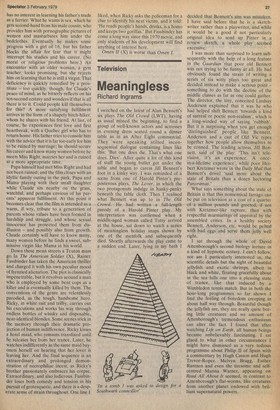Meaningless
Richard Ingrams
I switched on the latest of Alan Bennett's six plays The Old Crowd (LWT), having as usual missed the beginning, to find a group of well-known actors and actresses in evening dress seated round a dinner table as in an After Eight commercial. They were speaking stilted inconsequential dialogue containing lines like this: 'But one does die. That's what one does. Dies'. After quite a lot of this kind of stuff the young butler got under the table and began to caress Jill Bennett's foot in a kinky way. I was reminded of a scene from one of Harold Pinter's preposterous plays, The Lover, in which the two protagonists indulge in hanky-panky beneath the table cloth. Then I realised what Bennett was up to in The Old Crowd. He had written a full-length parody of a Harold Pinter play. My interpretation was confirmed when a middle-aged woman called Totty arrived at the house, sat down to watch a series of meaningless holiday snaps shown by one of the menfolk and subsequently died. Shortly afterwards the play came to a sudden end. Later, lying in my bath I decided that Bennett's aim was mistaken. I have said before that he is a sketchwriter rather than a playwriter, and while it would be a good if not particularly original idea to send up Pinter in a review sketch, a whole play seemed excessive.
I was more than surprised to learn subsequently with the help of a long feature in the Guardian that poor old Bennett was not trying to be funny at all. He had obviously found the strain of writing a series of six witty plays too great and decided instead to niake a serious point — something to do with the decline of the middle classes as far as one could gather.
The director, the tiny, conceited Lindsay Anderson explained that it was he who had helped shift Bennett 'towards a kind of surreal or poetic non-realism', which is a long-winded way of saying 'rubbish'.
But it is surprising when you get enough 'distinguished' people like Bennett, Anderson and a cast of Old Vic types together how people allow themselves to be conned. The leading actress, Jill Bennett, said of the play: 'This isn't tele vision, it's an experience. A once in-a-lifetime experience', while poor Herbert Kretzmer wrote in the Daily Mail that Bennett's drivel 'said more about the state of Britain than a dozen hectoring Panoramas.'
What says something about the state of Britain is that this nonsensical farrago can be put on television at a cost of a quarter of a million pounds and greeted, if not with Kretzmer-like rapture, then with respectful murmurings of approval by the assembled critics. In a healthy society Bennett, Anderson, etc. would be pelted with bad eggs and serve them jolly well right.
I sat through the whole of David Attenborough's second biology lecture in a kind of hypnotic ecstasy. I can't follow, nor am I particularly interested in, the scientific details but the sight of beautiful jellyfish and exotic shrimps, albeit in black and white, floating gracefully about in the sea lulls one into a pleasing state of trance, like that induced by a• Wimbledon tennis match. But in both the hour-long programmes so far shown I find the feeling of boredom creeping in about half way through. Beautiful though the jellyfish are, they are really quite bor ing little creatures and no amount of Attenborough's tremendous enthusiasm can alter the fact. I found that after watching Life on Earth, all human beings became unbelievably fascinating. I sat glued to what in other circumstances I might have dismissed as a very tedious programme about Philip H of Spain with a commentary by Hugh Casson and Hugh Trevor-Roper. Melvyn Bragg, Esther Rantzen and even the tiresome and selfcentred Marina Warner, appearing on Read All About It seemed, in contrast to Attenborough's flat-worms, like creatures from another planet endowed with brilliant supernatural powers.


































 Previous page
Previous page